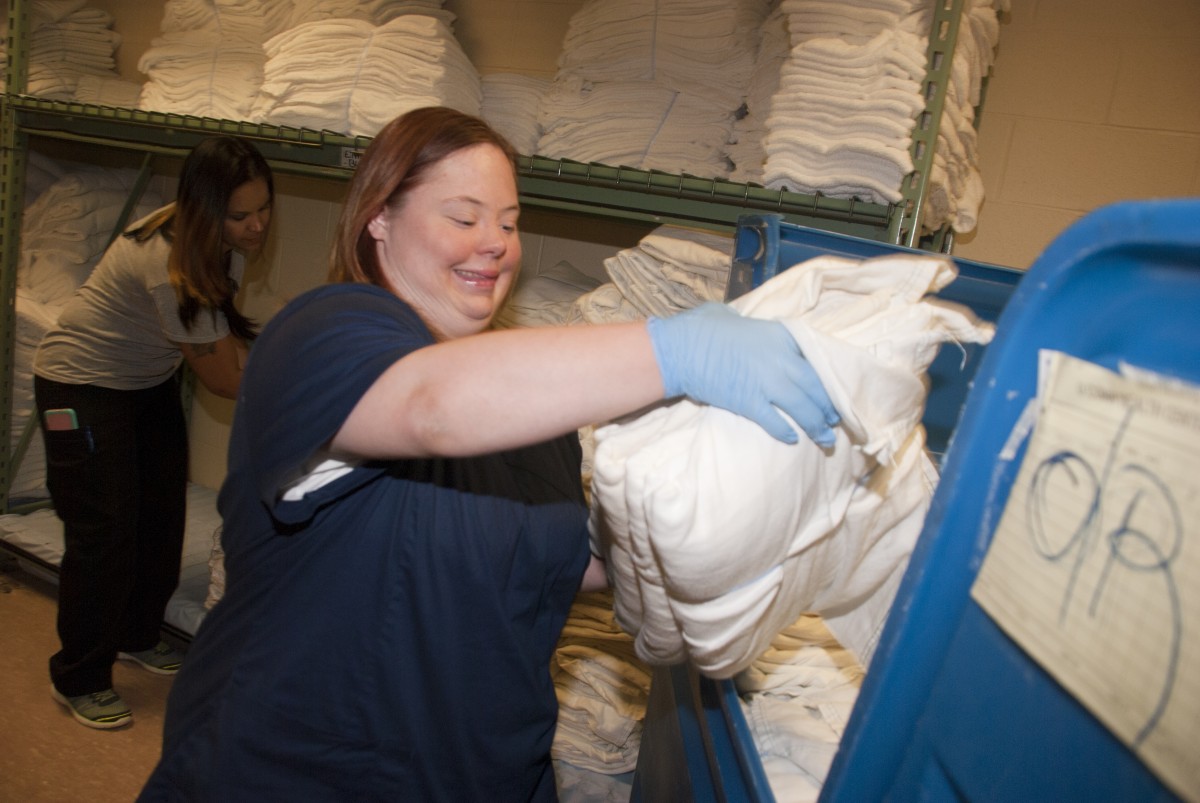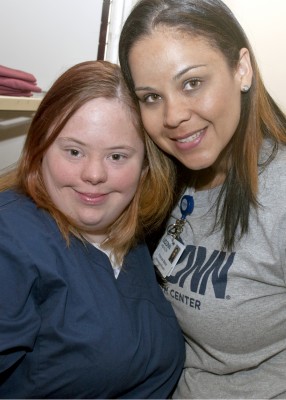
Kirsten Saraceno has been working at UConn Health for the last few months, rotating through assignments in the linen area, materials management, and human resources.
She’s one of two summer interns taking part in a pilot program at UConn Health in partnership with Favarh’s transition program for disabled young adults called Project SEARCH.
“What I like best about being here is the people,” Sarcaeno says. “I’ve learned to master social skills. I think it’s changed me, made me better with interaction and being social.”
The idea is to help those with intellectual disabilities transition from school to into adult life by preparing them for independent employment. UConn Health is one of only a few Project SEARCH host sites in the state.
Favarh, based in Canton, is a chapter of the Arc, a worldwide organization that supports people with disabilities. Favarh has partnered with the Connecticut Departments of Developmental Services and Rehabilitative Services, and UConn Health Human Resources, to bring the program to UConn Health.

“Our goal is to help individuals achieve their personal best,” says Sandy Finnimore, the Favarh site instructor at UConn Health. “Take Kirsten. She has grown so much. She’s made a lot of strides with communication and overcoming her shyness.”
Based on an international model developed at the Cincinnati Children’s Hospital nearly 20 years ago, Project SEARCH is dedicated to building a workforce that includes people with disabilities. The interns gain marketable and transferable employment skills through worksite rotations and hands-on learning. The program teaches job-searching skills, assists with the application process, and provides job coaching. The ultimate goal for each intern is competitive employment.
“Project SEARCH interns are very reliable and bring their best efforts every day, and employees gain a better understanding of working with a diverse workforce that includes people with disabilities,” says UConn Health HR Director of Organization and Staff Development Cindy Couture. “It really brightens your day, seeing the determination and commitment of these students.”
The other UConn Health summer intern, Matt (who agreed to be identified by first name only), has spent time working in materials management, the mail room, and contract services.
“I like meeting new people, working with other people, and treating other people with respect,” he says. “I like the mail room the best. You get to see where all the mail is.”
Finnimore says supervisors had to remind Matt to take his breaks because he didn’t want to stop sorting mail.
“Matt is very shy, but he’s gained a lot of confidence from the program,” Finnimore says. “Our students do well with repetitive tasks, and even complex repetitive tasks. This program gives them a chance to thrive.”
A typical day starts at 8 a.m. with a classroom session in the Munson Road building to go over problem solving, teamwork, decision making, and other skills for independent living and working. They arrive at their worksites by 9:30 for hands-on learning of the core skills of entry-level jobs, with new skills introduced as they master basic tasks. They get a lunch break after about two hours, then return to work until 1:30, when they gather their belongings and return to Munson Road for an afternoon classroom session to reflect on the day, plan for the next, and practice communication skills.
“I’ve seen Kirsten and Matt grow so much during their Project SEARCH experience,” Couture says. “They’ve earned positive reviews from their coworkers and supervisors and have gained core skills needed for an entry-level position in the community.”
Finnimore checks in on them to observe and identify areas that may need coaching. Both she and Couture credit much of the pilot program’s success to the enthusiasm, interest and support of UConn Health host department managers and staff mentors.
“They’ve been very well received,” Finnimore says. “We’re hoping to be able to bring in more interns for the regular school year.”
The first full year of the program starts next month, with several weeks of classroom instruction and skills assessment before the students start their work assignments. Any UConn Health work areas that may be interested in hosting an intern in the fall can reach Couture at ccouture@uchc.edu or 860-679-2035.
As for Sarcaeno, she hopes eventually to work in human resources.
“I see myself in HR, because I think it fits all my skills,” she says. “It can be simple, yet challenging. I can blend in, yet stand out.”